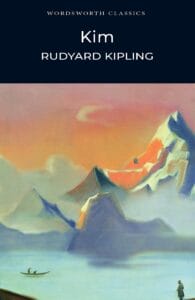
Book Summary
Kim is an exciting adventure book written by Rudyard Kipling. It was first published in 1901 and has since become a classic in children’s literature. The story takes place in India during the time of the British Empire and follows the journey of a young boy named Kim.
Kim is a thrilling tale filled with mystery, friendship, and bravery. The story begins with Kim, an orphan boy who lives on the streets of Lahore, a city in India. He is a clever and resourceful boy who knows how to survive in the bustling city.
One day, Kim meets a Tibetan lama who is searching for a sacred river. They become friends and embark on an incredible journey across India. Along the way, they encounter spies, secret agents, and dangerous situations.
Kim also gets involved in a secret mission for the British government. He becomes a spy and uses his intelligence and skills to gather information. But as he gets deeper into the mission, he starts questioning his loyalty and identity.
Throughout the book, Kim learns about different cultures, religions, and the complexities of life. He discovers the importance of friendship, loyalty, and staying true to oneself.
Kim is a coming-of-age story that explores themes of identity, adventure, and self-discovery. It provides a glimpse into the rich history and diverse cultures of India during the British Raj. The book also highlights the challenges faced by the people living under colonial rule.
Rudyard Kipling’s writing style is descriptive and captivating, making it easy for readers to imagine the vibrant settings and characters. The story is filled with suspense and excitement, keeping readers engaged from beginning to end.
Rudyard Kipling was a famous British writer born in India in 1865. He is best known for his books and poems about India and the British Empire. Kipling was awarded the Nobel Prize in Literature in 1907, making him the first English-language writer to receive this prestigious honor. His works continue to be loved and read by people of all ages around the world.
“Kim” is a captivating novel written by Rudyard Kipling, a Nobel laureate. Published in 1901, the book is a unique blend of adventure, mysticism, and a deep exploration of colonialism. Set against the backdrop of British India, the story revolves around a young Irish boy named Kimball O’Hara, known as Kim, who embarks on a journey of self-discovery.
“Kim” is a rich tapestry of vivid characters and exotic landscapes that transport the reader to the heart of India during the British Raj. The story is a thrilling adventure, but it also delves into the complexities of identity, loyalty, and the clash of cultures. Kim, the protagonist, is an orphaned son of an Irish soldier, who lives a vagabond existence in Lahore. His life takes a dramatic turn when he becomes the disciple of a Tibetan Lama on a spiritual quest. Simultaneously, Kim is drawn into the ‘Great Game’, a political conflict between Britain and Russia for control over Central Asia.
The narrative is engaging, filled with suspense, humor, and a profound understanding of human nature. Kipling’s detailed descriptions of the Indian subcontinent, its people, and their diverse cultures are truly remarkable, making “Kim” a literary masterpiece.
“Kim” is a complex novel that explores themes of identity, imperialism, and the East-West dichotomy. Kim’s dual identity as a white boy who identifies as Indian reflects the cultural and racial tensions of colonial India. His journey is not just physical but also spiritual and psychological, as he navigates between the worlds of the British and the Indians, the secular and the spiritual.
The ‘Great Game’ serves as a metaphor for the imperialistic ambitions of the European powers, highlighting the political undercurrents of the era. Kipling’s portrayal of India is nuanced; he appreciates its beauty and spirituality but also critiques its superstitions and social hierarchies.
Despite being a product of its time, “Kim” raises timeless questions about identity, belonging, and the human quest for meaning, making it relevant even today.
Rudyard Kipling (1865-1936) was an English journalist, short-story writer, poet, and novelist. He was born in India, which inspired much of his work. Kipling’s works of fiction include “The Jungle Book” (1894), “Kim” (1901), and many short stories, including “The Man Who Would Be King” (1888). His poems include “Mandalay” (1890), “Gunga Din” (1890), “The Gods of the Copybook Headings” (1919), “The White Man’s Burden” (1899), and “If—” (1910). He is regarded as a major innovator in the art of the short story.
Kipling was one of the most popular writers in the United Kingdom, in both prose and verse, in the late 19th and early 20th centuries. In 1907, he was awarded the Nobel Prize in Literature, making him the first English-language writer to receive the prize and its youngest recipient to date. Despite these accolades, he was also controversial for his views on race and empire, which have been the subject of much debate and criticism.
Don Quixote by Miguel de Cervantes
Miguel de Cervantes
Read Now →